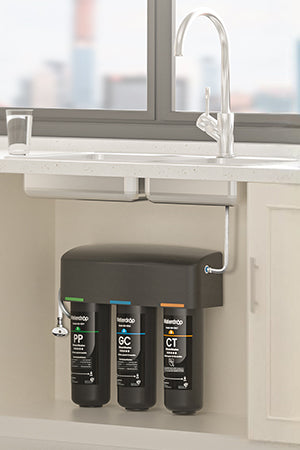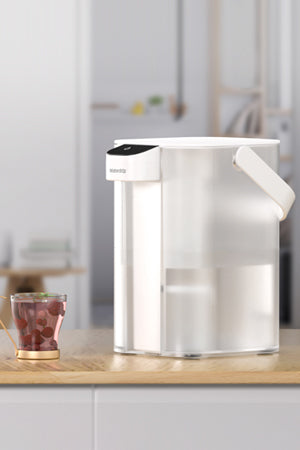Water is life, but not all water is safe or good to drink. Around the world, people use different methods to make water safe — boiling and filtration being two of the most common. But which one is better for your health, taste preferences and daily convenience: boiled water or filtered water?
In this article, we’ll break it down in simple terms so you can decide what’s best for you and your family.
Why Do We Need to Treat Drinking Water?
Even if water looks clear, it can still contain harmful contaminants. These include:
- Bacteria and viruses that can cause illness.
- Parasites that affect the digestive system.
- Chemicals from pollution, farming or old plumbing.
- Heavy metals like lead or mercury.
- Sediment like rust, dirt or sand.
Where you live, your tap water may already be treated by municipal facilities. But it may still pick up impurities along the way or you may just want an extra layer of safety. That’s where boiling and filtration come in.
Boiled Water – How It Works
Boiling water is one of the oldest and simplest ways to make it safer. When you heat water to 100°C (212°F) and keep it boiling for at least one minute (or three minutes at high altitudes), most disease-causing bacteria, viruses and parasites are killed.
Pros of Boiled Water
- Kills most microorganisms – Good for preventing waterborne diseases .
- Simple and cheap – No special equipment needed, just a stove or kettle.
- Good for emergencies – Useful when traveling or during a power outage if you have a gas stove.
Cons of Boiled Water
- Doesn’t remove chemicals – Boiling won’t get rid of pesticides, heavy metals or chlorine.
- Tastes flat – Heating water removes dissolved oxygen which can make it taste bland.
- Energy consuming – Requires electricity, gas or another heat source.
- Time consuming – You have to wait for water to cool before drinking.
Filtered Water – How It Works
Filtered water is treated by passing it through a device that traps or reduces contaminants. There are many types of water filters from basic carbon filters to advanced reverse osmosis systems.
Types of Water Filters
- Activated Carbon Filters – Improve taste and reduce chlorine, odors and some chemicals.Ceramic Filters – Remove sediment and some bacteria.
-
Reverse Osmosis (RO) Systems – Remove a wide range of impurities, including heavy metals, chemicals and microorganisms.
- UV Filters – Use ultraviolet light to kill bacteria and viruses.
Pros of Filtered Water
- Improves taste and odor – Removes chlorine and other compounds that cause unpleasant flavors.
- Removes a wide range of contaminants – Including heavy metals, chemicals and some bacteria.
- Convenient – Clean water is available instantly without boiling and cooling.
- Encourages hydration – Better taste often makes people drink more water.
Cons of Filtered Water
- Upfront cost – Buying a good quality water filter can be expensive.
- Maintenance required – Filters need regular replacement to remain effective.
- Varies by filter type – Not all filters remove all contaminants, so choosing the right system is important.
- Boiled vs Filtered Water – Key Differences
While both methods aim to make water safer, they work in very different ways. Boiling is good for killing germs but doesn’t remove chemicals or improve taste much.
Filtering can remove a wide range of contaminants including those that boiling can’t handle but won’t make unsafe water safe unless it’s designed to remove biological contaminants.
For example if your water source is contaminated with bacteria but not chemicals, boiling can be a quick solution. If your water has chemical pollutants, heavy metals or strong chlorine taste, a good
water filter is more effective.
Which One is Better for Daily Use?
For everyday drinking water, filtered water is often the better choice. Here’s why:
Convenient – No need to wait for cooling.
Better taste – Removes chlorine and other unpleasant compounds.
Comprehensive protection – Can target a wide range of impurities depending on the filter type.
Boiling is still useful in specific situations — for example during a boil-water advisory or when traveling to places with poor sanitation. But for long term daily use, filtration offers more benefits.
Health Considerations
Safety
Both boiling and filtering can make water safer but filtering generally offers broader protection when paired with the right technology.
Reverse osmosis for example can remove up to 99% of contaminants including heavy metals and pesticides that boiling can’t remove.
Nutrients
Some people worry that water filters remove healthy minerals like calcium and magnesium. While basic carbon filters leave minerals intact, reverse osmosis can remove them. This can be addressed by adding a remineralization filter which restores beneficial minerals for taste and health.
Hydration
Water that tastes clean and fresh encourages you to drink more. Many people find filtered water more appealing, leading to better hydration habits.
Environmental Impact
Boiling water consumes energy each time you prepare it whether from gas or electricity. In contrast water filters use little to no energy (except for RO systems with pumps) and reduce the need for bottled water helping to cut down plastic waste.
If you use bottled water to avoid boiling, switching to a
home water filter is both eco-friendly and cost effective.
Cost Over Time
While boiling may seem cheaper upfront, energy costs add up over time. For example boiling several liters a day can noticeably impact your utility bill.
A water filter requires an initial purchase and periodic filter replacements but over months or years it can be more affordable than constantly boiling water especially if you drink a lot.
Practical Recommendation
If you want the safest, cleanest and best tasting water for everyday use a high quality water filter is usually the better choice. Boiling is best reserved for emergencies or travel.
For maximum protection some people use both — filtering water first and then boiling it if they suspect a biological contamination risk.
Boiled water is good for killing germs, filtered water is good for improving taste and removing a wide range of impurities. For daily home use a good filtration system offers more convenience, better taste and more comprehensive contaminant removal.
If you live in an area with uncertain water quality, investing in a certified water filter can give you peace of mind and better health in the long run.





































































